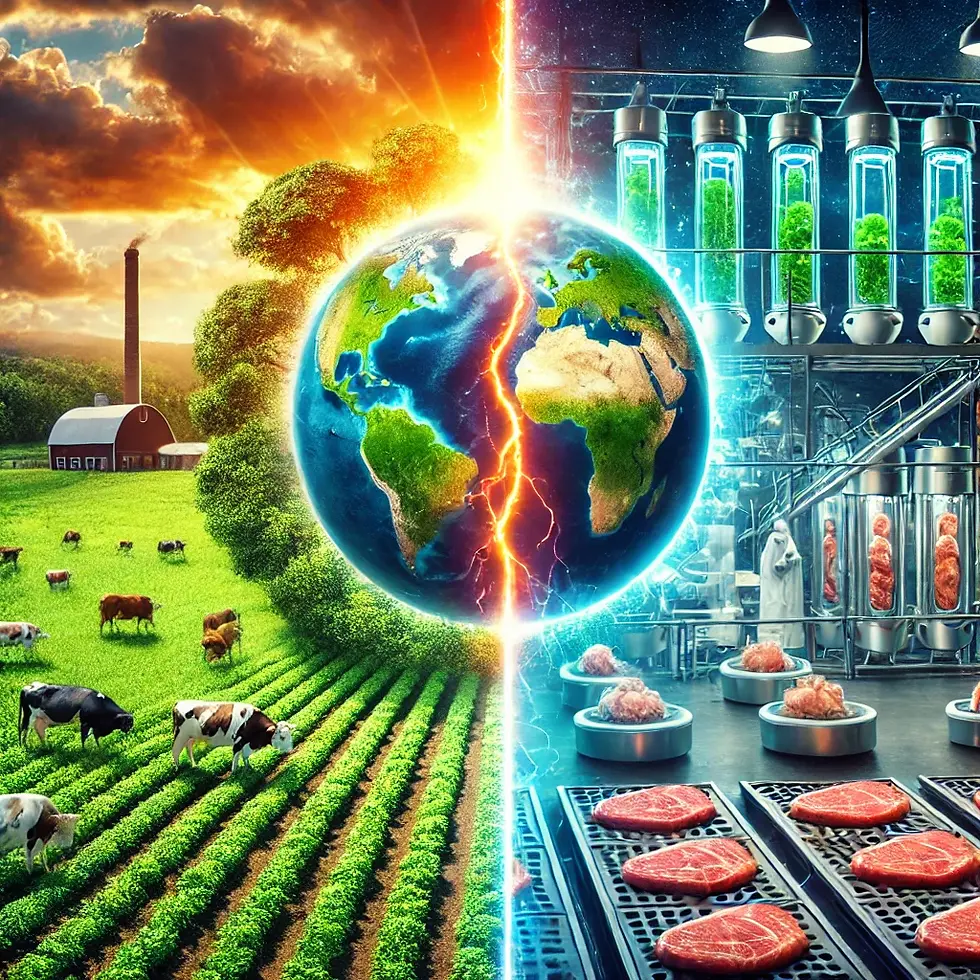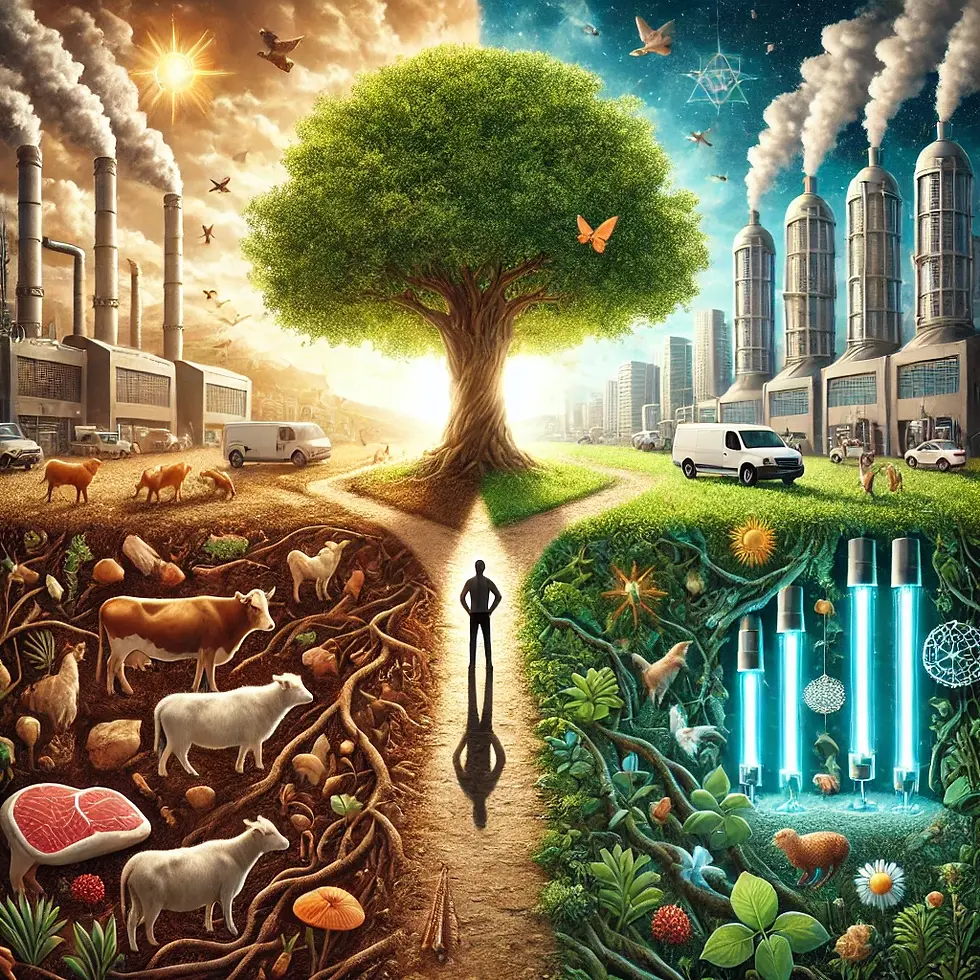The Future of Food: Lab-Grown Meat and Its Impact on Global Sustainability
- 21craynewschannel
- Dec 31, 2024
- 4 min read

Lab-grown meat, also known as cultured or cell-based meat, is heralded by some as the future of food production, promising to address environmental, ethical, and food security challenges. However, while the potential benefits of this technology are widely touted, it raises critical concerns about its implications for humanity’s connection to nature, food sovereignty, and overall well-being.
As we explore this innovation, it is essential to examine both sides of the conversation—acknowledging the claimed benefits while voicing the concerns of those who believe that food should remain natural and deeply rooted in ancestral traditions.
1. Understanding Lab-Grown Meat
Lab-grown meat is produced by cultivating animal cells in a laboratory environment. This process involves no slaughter, offering what some see as a "cleaner" alternative to traditional meat. Companies like Upside Foods and Aleph Farms are leading the charge, showcasing products like cultured chicken and steak.
However, for many, the idea of food grown in a lab feels fundamentally unnatural. Food is not just about sustenance; it’s about connection—connection to the earth, to culture, and to the ancestral practices that have sustained humanity for millennia. Lab-grown meat threatens to sever that connection, replacing it with something artificial and detached from the natural world.
2. The Promised Environmental Benefits

Advocates of lab-grown meat highlight its reduced environmental footprint:
Carbon Emissions: Cultured meat could cut greenhouse gas emissions by 92%.
Water and Land Use: It requires significantly less water and land compared to livestock farming.
Yet, we must ask: at what cost? These numbers fail to account for the environmental toll of the labs, bioreactors, and high-tech infrastructure required to produce cultured meat. Moreover, the production relies on synthetic growth mediums and energy-intensive processes that may not be as "green" as they seem when scaled globally.
Instead of seeking lab-grown alternatives, shouldn’t we focus on regenerative farming practices? Practices like rotational grazing and permaculture restore ecosystems, improve soil health, and maintain our connection to the earth—proving that we can address environmental concerns without sacrificing nature.
3. Ethical Concerns Beyond Animal Welfare
Lab-grown meat is often promoted as an ethical solution, eliminating the need for animal slaughter. But ethics extend beyond animal welfare:
Health Risks: Lab-grown meat is a new and largely untested product. Its long-term effects on human health are unknown, and relying on synthetic mediums and genetic modifications raises serious concerns.
Corporate Control: The production of cultured meat is concentrated in the hands of a few corporations and governments, increasing the potential for monopolization of our food supply.
Who controls the labs controls the food. This centralization of power is a threat to food sovereignty. Traditional farmers and communities would lose their ability to sustain themselves, becoming dependent on corporations for basic nutrition.
4. Food Security or Manufactured Dependency?
While lab-grown meat is presented as a solution to global hunger, it risks creating a new form of dependency:
Accessibility Issues: Currently, cultured meat is prohibitively expensive, and its production relies on high-tech infrastructure that many regions lack.
Synthetic Nutrition: Lab-grown meat may fill bellies but does not nourish the way natural foods do. Nature-designed food carries micronutrients, energy, and vitality that cannot be replicated in a lab.
True food security lies in empowering communities to grow their own food and return to ancestral practices that have sustained humanity for centuries. We don’t need a "solution" manufactured in a sterile lab; we need to return to the soil.
5. Why We Must Stay Rooted in Nature
Lab-grown meat is a stark departure from ancestral traditions. Our ancestors cultivated food with their hands, nourished by sunlight, rain, and the living soil. These practices carried spiritual and cultural significance, reinforcing our place in the natural order. Food grown in a lab removes us from this natural cycle, replacing it with a sterile, industrialized process.
The modern food system already alienates us from nature, with highly processed, chemically laden foods dominating our diets. These foods, designed for profit rather than health, have led to a global health crisis of obesity, diabetes, and malnutrition. Lab-grown meat threatens to take us even further down this path.
We must ask: are we truly solving a problem, or are we allowing the same elites and corporations that created our current food crisis to reshape the narrative and tighten their control over what we eat?
6. AI and Innovation with Purpose
It’s important to acknowledge the role of technology and AI in our lives. These tools can enhance our efficiency, creativity, and understanding of the world. However, technology should complement nature, not replace it. AI can help us analyze soil health, optimize crop yields, and innovate sustainable farming techniques—but growing food in a lab crosses a line.
7. A Better Path Forward
Rather than embracing lab-grown meat, we should focus on reconnecting with nature and promoting sustainable, ethical farming practices. Here are some actionable steps:
Support Regenerative Agriculture: Invest in local farms that prioritize soil health and biodiversity.
Educate Communities: Teach people about ancestral farming methods and how to grow their own food.
Demand Transparency: Advocate for clear labeling of lab-grown and genetically modified foods so consumers can make informed choices.
Preserve Food Sovereignty: Resist the monopolization of food systems by supporting small farmers and decentralizing food production.
8. Call to Action: Stay Grounded

We stand at a crossroads. The allure of technology is strong, but we must not lose sight of our roots. Food is more than fuel—it is a connection to the earth, a cultural expression, and a source of true nourishment. By rejecting lab-grown alternatives and embracing ancestral wisdom, we honor the natural order and ensure that future generations inherit a world that is balanced, vibrant, and alive.
Let’s move forward with intention—using innovation where it serves us, but always staying grounded in the truths of nature. Together, we can build a food system that is sustainable, ethical, and, above all, human. Subscribe to 21craynewschannel, and all the platforms ready to give valuable knowledge. THrilz Network

.png)



Comments